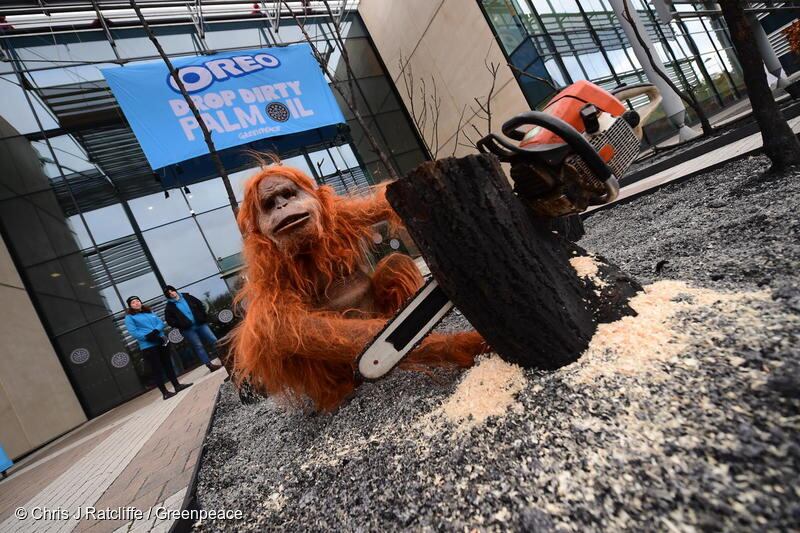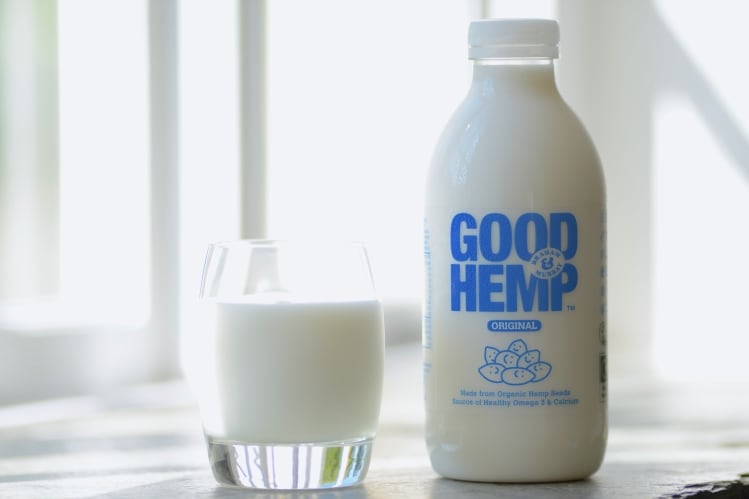More than 30 Greenpeace activists recreated a life-size burnt and smouldering rainforest, complete with life-like orangutan, at the main entrance of the headquarters in Uxbridge, west London.
They called for the Cadbury and Oreo maker to drop its ties to Wilmar International, one of world’s biggest agribusinesses.
Five climbers scaled the outside of the building to hang a banner that read ‘Oreo, drop dirty palm oil’, while others decorated it with giant Oreo-shaped stickers.
Activists also handed out information to staff about the impacts of Mondelēz’s alleged links to palm oil producers that destroy rainforest.
Greenpeace said Mondelēz had failed to keep a promise made in 2010 that it would stop buying palm oil from “forest destroyers”. Its own investigation found that palm oil suppliers to the company have destroyed 70,000 hectares of rainforest in the last two years.
‘Literally dying for a biscuit’
“Oreo [Mondelēz] promised to stop buying palm oil from forest destroyers years ago, but nothing’s changed and now, orangutans are literally dying for a biscuit,” said Greenpeace UK campaigner Fiona Nicholls.
“Palm oil can be grown without destroying rainforests and Oreo can help change the palm oil industry for good by dropping the dirtiest palm oil trader of all – Wilmar.”
Responding to the protest, Mondelēz said it was committed to eradicating deforestation in the palm oil supply chain, adding that it was actively working with suppliers to ensure palm oil was fully traceable.
A spokesman said the company was asking direct suppliers to call on their upstream suppliers to map and monitor the plantations where oil is grown. He added that, as a result of breaches, 12 companies were being excluded from its supply chain.
“We have actionable steps in place to make certain that the palm oil we buy is produced on legally held land, does not lead to deforestation or loss of peat land, respects human rights, and does not use forced or child labour,” the spokesman said.
‘Exclude those that do not’
“Mondelēz will continue to prioritise suppliers that meet our principles and exclude those that do not. We are calling on our suppliers to improve practices across their entire operations and to engage their third-party suppliers to ensure their palm oil production is 100% sustainable and traceable.”
At the end of 2017, 96% of Mondelēz’s palm oil was traceable back to mill and 99% was from suppliers with policies aligned to its own, the spokesman said.
“We will continue to contribute toward our common goal of achieving palm oil sustainability,” he added.
On Friday (16 November), Roundtable on Sustainable Palm Oil (RSPO) members agreed on a new palm oil standard to halt deforestation and improve human rights protection.
The RSPO Principles and Criteria (P&C) review aimed to “universally strengthen” social development, environmental protection and economic prosperity across the sustainable palm oil value chain.
The RSPO P&C is a set of environmental and social standards that member companies must comply with to meet RSPO certification standards.
It is reviewed every five years and benchmarked against the International Social and Environmental Accreditation and Labelling Alliance, a global membership association for credible sustainability standards.
The standards came into effect immediately, with existing RSPO grower members given a one-year transition period to implement them.



